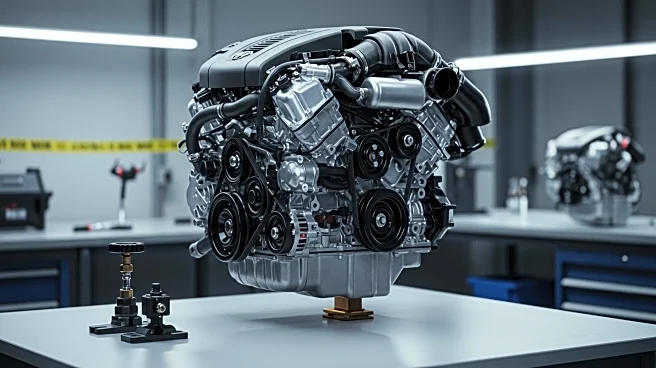What's Happening?
A recent revelation has highlighted the shared engineering between Land Rover and Ford, particularly concerning the engines used in certain Land Rover models. Mechanic Larry Law demonstrated in a viral video that some Land Rover vehicles feature engines with Ford branding, specifically the AJ-V8 family designed by Jaguar but produced at Ford's Bridgend Engine Plant in Wales. This collaboration stems from Ford's acquisition of Land Rover in 2000, which led to the production of several V8 engines at Ford facilities. The AJ-V8 engine, used in Range Rover models between 2009 and 2012, showcases the shared components between the two brands, including Ford-sourced automatic transmissions.
Why It's Important?
The discovery of Ford-branded engines in Land Rover vehicles has significant implications for owners and the brand's perception. On one hand, the use of Ford components can simplify maintenance and repair processes due to the widespread availability of Ford parts and familiarity among mechanics. This can lead to reduced repair times and costs. However, for luxury vehicle buyers, the presence of Ford branding may challenge the perceived exclusivity and bespoke nature of Land Rover's engineering, potentially affecting the perceived value of the vehicles. This situation underscores the broader industry practice of component sharing among luxury and mainstream brands to achieve cost efficiencies.
What's Next?
Following the closure of Ford's Bridgend Engine Plant, Jaguar Land Rover (JLR) has invested in its own engine production capabilities, moving operations to its Wolverhampton Engine Manufacturing Centre. This shift indicates a move towards more in-house production, potentially reducing reliance on external suppliers like Ford. As JLR continues to develop its manufacturing capabilities, it may further refine its brand identity and engineering exclusivity, addressing concerns raised by the shared components.
Beyond the Headlines
The practice of component sharing is common in the automotive industry, allowing luxury brands to maintain their identity while benefiting from cost efficiencies. This strategy is not unique to Land Rover, as other brands like Aston Martin and Bentley have similarly integrated components from their corporate partners. Understanding the origins of vehicle components can provide consumers with insights into the engineering and manufacturing processes, influencing their purchasing decisions.









